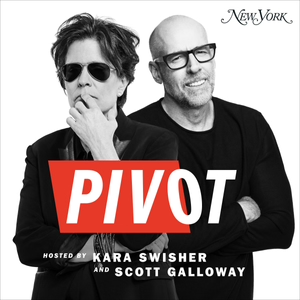
What Ireland’s Ecosystem Success Story Means for Crypto
08/06/21 • 54 min
In this week’s episode, we go to Ireland.
“Money Reimagined” co-hosts Sheila Warren and Michael J. Casey are joined by Michael O’Sullivan, the author of “The Levelling,” which describes the post-globalization era, and Lory Kehoe, director, Digital Assets & Blockchain at BNY Mellon and the founder of Blockchain Ireland.
This episode is sponsored by Unique One Network.
The topic, nominally, is the Biden Administration's proposal to harmonize international tax rates and Ireland’s resistance to that.
What does this have to do with crypto? A lot, it turns out.
A common concern among regulators of cryptocurrencies is that a lack of international harmony across jurisdictions creates “regulatory arbitrage” for developers of what is a global, borderless 24/7 technology and market.
The idea, flagged by Securities and Exchange Commission Chairman Gary Gensler in his impactful speech this week, is that if there’s no consistency in rules around the world, crypto businesses will pick and choose where they base their operations and tend toward the most lax regulatory regime. Regulators like Gensler fear this fosters a race to the bottom, opening the door for criminals and the worst actors to find their way in.
Makes sense, right?
But there’s another side to the story about the policy variance around the world. That is, it allows smaller countries to find opportunities they might not otherwise have to attract international investors and to build their own vibrant domestic economies on the back of that.
As we learn from Sullivan and Kehoe, Ireland’s use of competitively low corporate tax rates had a sweeping impact on the Irish economy that went far beyond multinationals setting up headquarters there. It was the spark that generated a vibrant ecosystem of innovation, a holistic growth machine that continues to underpin Ireland’s decades-long economic expansion.
With many in Ireland looking to create a crypto-friendly regulatory framework to encourage innovation in digital assets and fintech, that experience poses real questions about how far governments should go toward harmonizing their rules.
-
Unique One Network is an interoperable platform for DeFi-enabled NFT marketplaces, in a variety of sectors, built on Polkadot Parity Substrate. Unique One Network’s cross-chain NFT hub facilitates transfers between a variety of blockchains and ecosystems, unleashing the power of NFTs with myriad innovative capabilities. Find out more at Unique One Network.
-
Image credit: Lucas Bischoff/iStock/Getty Images Plus, modified by CoinDesk
See Privacy Policy at https://art19.com/privacy and California Privacy Notice at https://art19.com/privacy#do-not-sell-my-info.
In this week’s episode, we go to Ireland.
“Money Reimagined” co-hosts Sheila Warren and Michael J. Casey are joined by Michael O’Sullivan, the author of “The Levelling,” which describes the post-globalization era, and Lory Kehoe, director, Digital Assets & Blockchain at BNY Mellon and the founder of Blockchain Ireland.
This episode is sponsored by Unique One Network.
The topic, nominally, is the Biden Administration's proposal to harmonize international tax rates and Ireland’s resistance to that.
What does this have to do with crypto? A lot, it turns out.
A common concern among regulators of cryptocurrencies is that a lack of international harmony across jurisdictions creates “regulatory arbitrage” for developers of what is a global, borderless 24/7 technology and market.
The idea, flagged by Securities and Exchange Commission Chairman Gary Gensler in his impactful speech this week, is that if there’s no consistency in rules around the world, crypto businesses will pick and choose where they base their operations and tend toward the most lax regulatory regime. Regulators like Gensler fear this fosters a race to the bottom, opening the door for criminals and the worst actors to find their way in.
Makes sense, right?
But there’s another side to the story about the policy variance around the world. That is, it allows smaller countries to find opportunities they might not otherwise have to attract international investors and to build their own vibrant domestic economies on the back of that.
As we learn from Sullivan and Kehoe, Ireland’s use of competitively low corporate tax rates had a sweeping impact on the Irish economy that went far beyond multinationals setting up headquarters there. It was the spark that generated a vibrant ecosystem of innovation, a holistic growth machine that continues to underpin Ireland’s decades-long economic expansion.
With many in Ireland looking to create a crypto-friendly regulatory framework to encourage innovation in digital assets and fintech, that experience poses real questions about how far governments should go toward harmonizing their rules.
-
Unique One Network is an interoperable platform for DeFi-enabled NFT marketplaces, in a variety of sectors, built on Polkadot Parity Substrate. Unique One Network’s cross-chain NFT hub facilitates transfers between a variety of blockchains and ecosystems, unleashing the power of NFTs with myriad innovative capabilities. Find out more at Unique One Network.
-
Image credit: Lucas Bischoff/iStock/Getty Images Plus, modified by CoinDesk
See Privacy Policy at https://art19.com/privacy and California Privacy Notice at https://art19.com/privacy#do-not-sell-my-info.
Previous Episode

Why Bitcoin Needs Its Critics: A Conversation With Noelle Acheson
You can think of this week’s episode as a nod to what crypto people call the “no coiners,” an effort to listen to the community’s critics and weigh the value of their analysis.
This episode is sponsored by Unique One Network, Mimo and Quantstamp.
To do so, “Money Reimagined” co-hosts Sheila Warren and Michael J. Casey are joined by Noelle Acheson, head of Market Insights at Genesis. (A trading company, Genesis is owned by CoinDesk parent Digital Currency Group.) The trio take a couple of crypto-critical essays and dissect them.
At a time when cryptocurrencies seem to be under attack, especially from government officials, it’s tempting for people in the crypto community to drop into defensive mode, which mostly translates into dismissive mode.
Whether it’s criticisms of bitcoin’s energy usage, complaints about illicit activity through crypto, or people pointing out how many outrights scams are run through this technology, the industry’s response is typically to mock the critic for their ignorance or hypocrisy in ways that can sound to outsiders like whataboutism.
Sure, sometimes it’s warranted, as with Crypto Twitter’s response to Sen. Elizabeth Warren’s (D-Mass.) claim earlier this week that a crypto-based financial system would be run at the “whims of some shadowy, faceless group of super-coders.” Some memes were acutely on point; many others were just downright hilarious.
But often the knee-jerk dismissiveness backfires against the community. It can come across as cult-like, a failure to embrace and learn from criticism and a reluctance to consider the views of others. This is not how you bridge divides and expand adoption.
So, in its own humble attempt to take a more reflective stance, “Money Reimagined” takes a look at two noteworthy criticisms of the crypto space.
One is a thoughtful essay entitled “I, Token: The untold story of the hole in Bitcoin's heart” from Brett Scott, an essayist who explores the intersection of money and society, often with the bent of an anthropologist. The piece argues that bitcoin enthusiasts fail to imbue the cryptocurrency with true meaning because they focus on the “function” of bitcoin (what it does) and not its structure (what it is). Along the way, he makes some compelling points about the difference between “price” and “value.”
The other is a blog post by International Monetary Fund staffers Tobias Adrian and Rhoda Weeks-Brown, in which they argue cryptoassets are not viable for governments to explore as alternatives to state-run currencies.
We hope you enjoy listening.
-
Unique One Network is an interoperable Platform for DeFi enabled NFT Marketplaces, in a variety of sectors, built on Polkadot Parity Substrate. Unique One Network’s cross chain NFT hub facilitates transfers between a variety of blockchains and ecosystems, unleashing the power of NFTs with myriad innovative capabilities. Find out more at Unique One Network.
-
Mimo is home of the world’s #1 euro-algorithmically pegged token minted at an interest rate of just 2%. Lock in your crypto assets, access their liquidity, and stabilize your portfolio by hedging against inflating coins. Open a Vault and experience the power of Mimo today at mimo.capital.
-
Quantstamp is the leader of blockchain security, having secured over 100 billion USD worth of digital assets. Visit quantstamp.com to learn why top DeFi projects like Maker, Compound and BarnBridge trust Quantstamp to secure the financial infrastr...
Next Episode

The Nixon Shock: 50 Years of Money Without Gold
This week on “Money Reimagined,” we reflect back on the “Nixon Shock” of Aug. 15, 1971 - 50 years ago this week – when the dollar was removed from its peg to gold and the world of finance was turned upside down.
This episode is sponsored by Unique One Network.
Eswar Prasad, an economics professor at Cornell University, senior fellow at the Brookings Institution and author of a number of books on currencies and the international monetary system, joined Michael Casey and Sheila Warren to discuss the legacy of this moment. Also chiming in was CoinDesk’s managing editor of podcasts, Adam B. Levine.
When President Richard Nixon made his drastic decision to remove the dollar from its peg to gold, it prompted all other countries to de-peg their currencies from the dollar, thereby ending the Bretton Woods managed exchange rate system that had been in place since 1944. By extension, it kickstarted the era of fiat currencies that we still live in.
The world that emerged out of that move – one in which the supply of currencies was now at the discretion of monetary officials – set the tone for the current challenges of the global financial system and the powerful role that central banks now play. This monetary history also provides vital context for the efforts by bitcoin and cryptocurrency advocates to build an alternative to that system.
Prasad recognized the disruption that digital currency technology seems poised to bring to the world of money and sees a competition for supremacy emerging. However, he was lukewarm about the utility of bitcoin in that future, in part because he believes the element that most bitcoiners are drawn to – its fixed supply – is more of a bug than a feature. The real risk in the global economy, he says, is a fall in prices, not inflation. To stave off the threat of a self-destructive deflationary spiral, he said, monetary issuers need discretionary power to increase money supply
That set up a healthy debate with Levine, who argued for the superiority of the Bitcoin protocol’s predictable supply function to generate public “trust” over the discretion of central bankers and who claimed that inflation has been severely understated ever since the Nixon Shock.
-
Unique One Network is an interoperable platform for DeFi-enabled NFT marketplaces, in a variety of sectors, built on Polkadot Parity Substrate. Unique One Network’s cross-chain NFT hub facilitates transfers between a variety of blockchains and ecosystems, unleashing the power of NFTs with myriad innovative capabilities. Find out more at Unique One Network.
-
Image credit: Bettmann/CORBIS/Bettmann Archive via Getty, modified by CoinDesk
See Privacy Policy at https://art19.com/privacy and California Privacy Notice at https://art19.com/privacy#do-not-sell-my-info.
If you like this episode you’ll love
Episode Comments
Generate a badge
Get a badge for your website that links back to this episode
<a href="https://goodpods.com/podcasts/money-reimagined-180577/what-irelands-ecosystem-success-story-means-for-crypto-16048885"> <img src="https://storage.googleapis.com/goodpods-images-bucket/badges/generic-badge-1.svg" alt="listen to what ireland’s ecosystem success story means for crypto on goodpods" style="width: 225px" /> </a>
Copy




